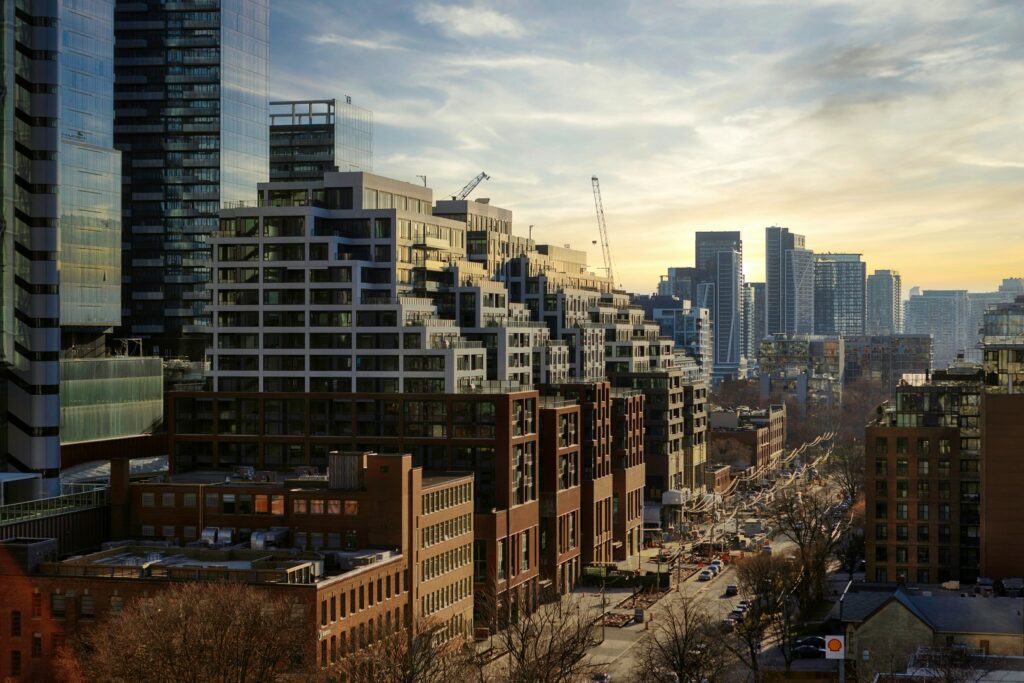I was down in Idaho for a vacation, but that doesn’t mean that I was off the clock.
I sold a few properties while I was away, and I also made on offer for a buyer that got really, really interesting when it came to the subject of the Status Certificate condition.
The only way to get this condo, it seemed, was to go in “unconditional.”
It wasn’t something I was prepared to let my buyer do, and I’ll explain why…

Get ready to call this hypocritical, since I’m going to suggest that you can’t make an offer on a condo without a condition on a review of the Status Certificate, but you can make an unconditional offer on a house, without doing an inspection.
Let me explain the difference…
In the Toronto housing market in 2016, you absolutely, positively, will not be successful, in a competitive situation (ie. there are ten offers on a house, and you are one), if you have a conditional offer.
It just won’t happen.
Even if you offer the most money, the seller and the listing agent will never take the risk that the deal falls through, since they can’t go back to the well again.
However, I’m not saying you can’t do a home inspection.
You just can’t have a condition on a home inspection.
When you’re looking at a house, you can hire a home inspector to complete a full inspection on your behalf, in advance of the listing. Some people don’t want to do this, because they fear losing $500 as a “sunk cost” on the inspection, if they don’t “win” on offer night.
But if you have any qualms about the house, then isn’t $500 a good investment toward your $800,000 asset?
Now a good listing agent will undoubtedly complete a “pre-inspection” as part of the listing service, and marketing of the property, and proudly display that inspection on the dining room table for all buyers to see.
I know, I know – you’re skeptical. You assume that the listing agent and the home inspector are somehow in cahoots. I’ve written entire blog posts about this, and I think it’s incredibly naive to think that a reputable inspector (we are talking about a reputable inspector, from a reputable firm here…) would risk his or her entire career for a hundred bucks. But believe me, or don’t – you’re still free to do your own inspection.
So why do I think that “no condition on inspection for the purchase of a house” is a different situation than “no condition on the purchase of a condo?”
Four reasons:
- You will not be successful with a condition, when in competition, on a house. Ever. Period.
- You can conduct a pre-inspection on the house.
- You can’t really pre-order the Status Certificate for a condo.
- Unconditional offers on condos are rare.
So let me detail the situation I had last week.
My buyer was interested in a downtown Toronto loft that is exceptionally rare, that was under-listed, with an “offer date,” to attract multiple offers.
The property was under-listed, no doubt about it. By upwards of $75-$100K.
Listed at $699,800, we put together a bully offer for $755,000, thinking that if they took it, we’d be getting the property for under fair market value, and if they didn’t – we’d gain some insight as to their expectations. But we also figured we might pique their interest, and perhaps we could get it for $765,000.
We figured it could sell for $800,000 on offer night, but that’s not how we valued the property.
We submitted our offer, and the listing agent called me and said that his client was going to wait for offer night.
He said they would have to be “blown away” by the price.
But he also said that the offer would have to be unconditional.
I said we could do better on the price, but that an unconditional offer was an absolute deal-breaker.
Unlike a house where you can do a pre-inspection, you can’t pre-order the Status Certificate for the condo. I mean, you could in theory, but it takes up to ten business days to receive – that’s mandated in the Condominium Act. So whereas you can get an inspector out from Carson Dunlop to roll through the house tonight, you can’t do the equivalent with a condo.
I told the listing agent that we would wait until offer night, and that was that.
My client was happy that we made the attempt, and we planned to regroup the following week.
Two days later, the listing agent called me and left a voicemail:
“David, we just got an absolutely crazy offer on the property. We’re going to work with it for sure, so I’m giving you the heads up as I know you had some interest. But to compete with this, you’d have to be a lot higher than where you were with your bully, and oh yeah, this offer is also unconditional.”
And just like that, the property was out of our reach.
I’m an aggressive agent, and I understand the whole “omelet and broken eggs” thing.
I also understand risk-reward scenarios, but when it comes to going in with an unconditional offer on a condo, I just can’t advise a client to do it.
The whole purpose of a lawyer’s review of the Status Certificate is to not only ensure there’s nothing wrong with the building or the unit, but to make sure that you got everything correct in the offer!
Do you know how many times a lawyer has reviewed a Status Certificate and realized that either the buying agent, or selling agent, or the seller him or herself, or even property management, doesn’t have correct parking space or locker?
I had a colleague who recently sold a condo, that had a locker in the MLS listing, and had a locker in the Agreement of Purchase & Sale, but the seller didn’t actually own a locker! Without a review on Status Certificate, they would have had a huge problem on closing.
But the review of the Status Certificate is essentially like the inspection on a house: you look for red flags.
How much money is in the reserve fund? Is it ample?
Are there any major expenditures forecast for the building? If so, can the reserve fund cover it?
Are there any special assessments planned?
Are there any increase in maintenance fees scheduled?
Are there any lawsuits pending against the condominium corporation?
Are there any liens or encumbrances?
Are there any outstanding judgments against the corporation?
Are there any claims under the Ontario New Home Warranty Act?
Are there any rules or regulations that the owners wouldn’t like, ie. no pets allowed, or no BBQ’s allowed on the 1,000 square foot terrace that you just bought for barbecuing?
When was the last reserve fund study conducted?
Is the building running a surplus or a deficit?
And then what about the unit owner and the unit?
Are there any outstanding maintenance fees or property taxes on the unit?
Are the accounts of the unit owner (with property management and utilities companies) in good standing?
Has the unit owner made any improvements/alterations to the unit that were against building policy, for which the board is now asking the unit owner to repair?
–
I certainly don’t want to it to sound like there’s more risk or more to check up on with a condo than a house.
Believe me, we could make a list ten times as long for a house.
But with a house in Toronto, the inspection is physical. You can walk through the house and look, see, and touch, and most importantly – you have the opportunity to review the listing agent’s pre home inspection, or do an inspection of your own.
With a condo in Toronto, the inspection is of the corporation and their financials, rules and regulations, and declaration. You’re a partner in that property with 100 or 500 other people.
So to simply make an unconditional offer on a condo, especially when about 99% of all offers are conditional on a lawyer’s review of a Status Certificate, you’re basically saying, “Whatever happens, happens.”
If there’s a pending special assessment for $18,000 per unit, you’re on the hook.
If maintenance fees are increasing by 18% next year, then you have to be okay with that, because you’re going ahead with the deal.
If there’s a $2,000,000 repair scheduled for next year, and the condominium corporation’s reserve fund is sitting at $800,000, then be prepared to open your wallet.
If the building has a strict “no pets” policy, then give Lucy and Patches to your friend, and visit the pups on weekends.
In a market where 99% of offers are conditional, I see almost no reason to make your offer unconditional, in order to compete.
I always leave the final say up to the client, but I’ll tell them, “You can make an unconditional offer, but you’d better really, really want this place, and be willing to take the risk that there’s a small issue, or a large issue, however low that risk is.”
And then more often than not, I’ll tell them point blank, “I don’t think you should do it. But it’s up to you.”
In the case of last week’s offer, my client agreed. He simply said, “There will be others,” and it’s true.
The housing market and the condo market are very different.
Condos appreciate at a rate of perhaps half that of houses, but there’s also a fraction as much competition.
The way I see it, most houses have competition, and your offer has to be unconditional. Most condos don’t have competition, and your offer is 99% likely to have a condition.
So when you find yourself in the situation where your offer on a condo needs to be unconditional, you simply walk away.































Lawrence
at 9:15 am
So wouldn’t it be a good idea for the seller to pre-purchase the status certificate?
Libertarian
at 11:15 am
Exactly, Lawrence. If the selling agent of a house can get a pre-inspection done by the time the house gets listed, what is stopping the selling agent of a condo to order the Status Certificate 2 weeks before the place is listed? Wouldn’t this get more buyers to the table because they would feel more reassured about making an offer?
But if I had to guess, since most condos don’t get multiple offers (as David indicates), the seller does not want to incur any extra costs or do any more work than necessary (insert joke about the lazy, unprofessional real estate agent) . Let the would-be buyer order the Status Certificate.
Sprinkles
at 12:40 pm
I see your point Libertarian and Lawrence but you would have to know that the condo is going on the market before it is actually listed. This is rarely possible unless you have a connection the agent ie. they work at your brokerage or they reach out to you directly. It takes about 10 days for the status certificate to come in so you would have to know well in advance that the unit was going on the market. You do have the option of waiting to make an offer until you receive the status certificate but as David has pointed out many times Toronto’s market moves really fast so you risk losing the unit all together.
Libertarian
at 1:10 pm
Sprinkles – neither Lawrence or I referred to the buyer or the buyer agent ordering the Status Certificate. We mentioned the seller and the selling agent. Someone who is putting their condo up for sale knows when it’s going on the market. So two weeks before that, he/she (or his/her agent) should order the Status Certificate. They can then refer to it in the listing….”Status Certificate available for review”. Then it would be their prerogative to request unconditional offers.
David Fleming
at 3:00 pm
@ Lawrence
Not looking to toot my own horn here, guys, but when I list a condo, I order the Status in advance.
If the building is in great financial shape, I like to use the Status to market the property.
I’ll provide “take away” copies of the Status summary and put them next to the feature sheets.
I’ll highlight the $2,000,000 reserve fund, the fact that there’s no special assessments, and no maintenance fee increases. I’ll often put that in the listing.
Why don’t other agents do it? Maybe because they’re lazy, or maybe because they don’t know any better.
It simply can’t be about the cost. It’s $125 for the Status, and the agent is going to pay for it eventually. Well, maybe some really cheap agents worry that the condo won’t sell, and they’ll have spent $125 for nothing? But that’s nuts. I pay $400 for my photo package because it’s the best, when other companies charge $99, and some agents use their iPhone. So maybe I shouldn’t be surprised by anything these days…
Marina
at 2:12 pm
I would buy a house without an inspection, but not a condo without reviewing the status certificate.
If I buy a house and it turns out it needs major repairs – foundation work? Wiring? New roof? Whatever. It’s a huge risk and maybe I’m on the hook for a huge amount of money. Let’s go crazy and call it $100K. It would be a nightmare. But once it’s fixed, we can move on with our lives.
With a condo, if there is a special assessment or a massive jump in fees, I might be on the hook for years and years. Heck, I might have a hard time selling the place five years down the road. There is way too much dependency on other people to take the risk.
At least that’s where I’m sitting.
Kyle
at 5:12 pm
I agree, I’d be more willing to forego a home inspection, than a status certificate review. IMO it’s far easier for me to see the red flags in the condition of a home, than the red flags in the health of a corporation. As well good point on the closure aspect. With a home you can usually address any surprises that crop up and move on. With condo corporations, there are many potential surprises that can’t simply be addressed or get dragged out over years like litigation, outstanding loans, being on CMHC’s do not insure list, etc.
H Marshall
at 3:19 pm
Buying a condo without a careful review of the complete status certificate package is foolish.
You want to know if the condo allows short-term rentals in the declaration. You want to have an idea of the percentage of renters; pet restrictions, understand all the by-laws and rules. You are buying into a private corporation as well as a home. You need to be able to read the audited financial statements. Is there an operating deficit? Any warning notes in the back from the auditor?
When I bought my condo, I spent three hours reading through the status certificate at the real estate office, did a full inspection of the unit and the common elements, walking through three floors, staircases and both parking levels. I also walked around the outside and checked on the building’s history and reputation.
Then I put in an offer which was rejected.
That was fine as we knew this was the condo corporation where we wanted to live. There would be other units. We waited a few weeks and sure enough another one went up for sale. All I had to do is inspect the unit.
That one we bought.
Condos are different than houses. Houses own land. With a condo you own a tiny fraction of the land.
Condodweller
at 6:16 pm
I would not buy a condo without a condition on status certificate however I believe this is one area where a good, high volume agent can provide value. If I found a unique condo that had everything I was looking for I would consider making an unconditional offer if my agent had credible information from a recent previous sale in the building. I know a status certificate from another sale will not have information about the specific unit I am looking at but it should reveal any major financial issues about the corporation.
I also find it odd that selling agents don’t make the certificate available as a matter of practice. Are you saying that if the agent doesn’t get it ready and waits for an offer the buyer has to pay for the certificate? While I understand that things move fast in Toronto’s market, are they really so fast that there is no time to order the certificate? When I sold my place I didn’t know it took ten days for the certificate, however, when I ordered it, it only took a few days.
GwenV
at 10:13 pm
Or, in the case of a condo I owned in Toronto, the engineer who did the reserve fund study missed that there was a huge leak in the foundation of the condo which was causing some of the basements to leak. I always wonder why buyers don’t get a specialist in condo building restoration to do an independent inspection. A company like that will see things that the engineer often misses. I speak from experience — I worked for a building restoration company who worked on a lot of foundations and ramps and balcony restoration and the engineers weren’t the brightest.
TV
at 2:49 am
Tried to buy this really nice King West boutique loft and several offers (including mine) were made first day of list. The person who got it made an unconditional offer 20K above asking. I guess he/she REALLY wanted it.
IanC
at 8:45 am
If there’s a sale in a large condo at least every month, can you contact the latest buyer for info? The information may be a couple of weeks old, but it could minimize the risk if competing with an unconditional offer and you found the perfect place and were motiviated. Indirect info is not as accurate as having the documents in front of your face, but it could be better than nothing if someone was already determined to go in without reviewing the status certificate.
Elly
at 11:26 am
It’s spooky how clever some ppl are. Thnksa!
Linh
at 10:26 pm
Would it be wise to accept the Status Certificate of other units but under same management? This is relating to a stack townhouse. The seller will not provide me with the Status Certificate of the unit being sold. Said it will take time to get and I may change my mind. However, they’re willing to provide me one from another unit of previous year. Is this acceptable?